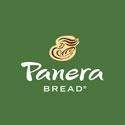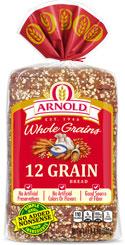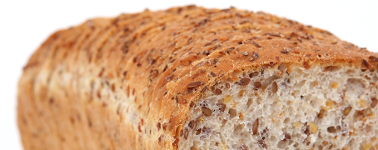Companies
Panera Bread Re-Introduces Double Bread Bowl For Two Weeks

Panera Bread introduced a double-bowl version of its bread bowl nationally on February 14 for two weeks only. The Double Bread Bowl was available starting at $9.99 and is essentially the same as the classic bread bowl but twice as long, allowing for double the amount of soup or mac-and-cheese filling. Panera tested the Double Bread Bowl in Philadelphia in 2018. The company said a test launch resulted in “an overwhelming response on social media from fans asking, 'When will Double Bread Bowls come to my city?'" [Image Credit: © Panera Bread]
Legalized Marketing Of Homemade Baked Goods Is Boon For Cottage Bakers
 In the 48 states that permit the it, sale of homemade baked goods is improving lives in big and little ways, according to a public-interest law firm that represents the interests of home bakers in several states. Median monthly sales are a modest $200, but to many home bakers the money “makes a big difference to their financial well-being," the Virginia-based Institute for Justice states in a report drawn from a survey of 79 home-based bakers in Wisconsin, where a circuit court judge ruled in 2017 that laws against selling homemade baked goods are unconstitutional. Only New Jersey still bans the sale of bakery items made in a home oven. Wisconsin still bans the sale of homemade chocolate candy, cheesecake, cream pies or no-bake desserts. [Image Credit: © Pexels from Pixabay]
In the 48 states that permit the it, sale of homemade baked goods is improving lives in big and little ways, according to a public-interest law firm that represents the interests of home bakers in several states. Median monthly sales are a modest $200, but to many home bakers the money “makes a big difference to their financial well-being," the Virginia-based Institute for Justice states in a report drawn from a survey of 79 home-based bakers in Wisconsin, where a circuit court judge ruled in 2017 that laws against selling homemade baked goods are unconstitutional. Only New Jersey still bans the sale of bakery items made in a home oven. Wisconsin still bans the sale of homemade chocolate candy, cheesecake, cream pies or no-bake desserts. [Image Credit: © Pexels from Pixabay]
North Carolina Baker Seeks To Revive The Community Bakery Tradition
 A North Carolina baker has launched a Community Supported Bakery (CSB) at a location in a small town that has housed several start-up bakeries over the years. The idea is based on a European tradition that arose at a time when many individual homes lacked ovens; outdoor ovens became community gathering places. The space in Marshall does not have a retail facility, but has been used for baking workshops, a tradition Brennan Johnson and his Walnut Schoolhouse bakery plans to continue and grow. Johnson says he will sell sourdough breads at local farmers markets, and his workshops will focus on Scandinavian baking. Other bakers will teach cakes, croissants, bagels and other subjects. Johnson has been baking since high school. He travelled to Europe with his parents in ninth grade to research old community ovens to learn how they became community-gathering places.[Image Credit: © jacqueline macou from Pixabay]
A North Carolina baker has launched a Community Supported Bakery (CSB) at a location in a small town that has housed several start-up bakeries over the years. The idea is based on a European tradition that arose at a time when many individual homes lacked ovens; outdoor ovens became community gathering places. The space in Marshall does not have a retail facility, but has been used for baking workshops, a tradition Brennan Johnson and his Walnut Schoolhouse bakery plans to continue and grow. Johnson says he will sell sourdough breads at local farmers markets, and his workshops will focus on Scandinavian baking. Other bakers will teach cakes, croissants, bagels and other subjects. Johnson has been baking since high school. He travelled to Europe with his parents in ninth grade to research old community ovens to learn how they became community-gathering places.[Image Credit: © jacqueline macou from Pixabay]
Vegan Bakeries Sprout Across The State Of Maine

Vegan bakers in Maine, committed to providing vegan baked goods for all purposes and occasion, have begun making vegan cakes. Mandaylynn Fleshman of Scattoloni Bakery in Portland makes vegan cakes for birthdays, anniversaries and other special occasions, and makes sure the display case is stocked with at least two types of vegan cupcakes, chocolate mousse cups (made with aquafaba), chocolate-cherry cake bomb truffles, chia-spiced shortbread, and coconut-orange date balls. But vegan cakes aren't just a Portland thing: they are appearing at bakeries across the state, a trend fueled by the fact that more people are eating vegan, and more people are avoiding dairy products and eggs due to allergies and intolerances. The availability of vegan cakes is a marked change from even a few years ago.[Image Credit: © Raegamuffin's Gluten Free Bakery]
“Third Culture” Bakers Bring Mochi Muffins To S.F. Bay Area

The mochi muffin has been slowly working its way into San Francisco Bay Area cafe culture since 2017, thanks to Indonesian immigrant and “third culture” baker Sam Butarbutar – he spent many of his younger years both in Indonesia and the U.S. The mochi muffin marries the flavor of a Southeast Asian steamed layered cake made with mochiko flour milled from sticky rice, coconut milk and pandan. The mochi muffin is caramelized on the outside with dense innards, all sprinkled with black and white sesame seeds. According to food writer Leena Trivedi-Grenier, the muffin is “a beautiful medley of textures combining chewy Hawaiian butter mochi and the brittle edges of an American brownie.”[Image Credit: © Third Culture Bakery from Instagram]
Bimbo Says Its Arnold, Brownberry, and Orowheat Bread Is Now “Clean Label”

Bimbo Bakeries USA announced that one of its bakery brands is now being produced without artificial preservatives, colors, flavors, or other dubious compounds and chemicals. The company’s “No Added Nonsense” initiative was created to meet consumer demands for “clean label” baked goods with “simple, easy-to-recognize” ingredients, the company said. The Arnold, Brownberry, and Oroweat brand also removed monoglycerides, diacetyl tartaric acid esters of monoglycerides (DATEM), and high-fructose corn syrup from its whole grain line, which includes Oatnut, 100 percent Whole Wheat, 12 Grain, Healthy Multi-Grain and Health Nut. In previous years, the brand removed bromate, bleached flour, azodicarbonamide (ADA), SSL & CSL, and partially hydrogenated oils (PHOs) from all breads.[Image Credit: © Bimbo Bakeries USA, Inc.]
Arizona Bakery Chain Celebrates French Bread Day With Discounted Loaves
 To celebrate “National French Bread Day,” family-owned, Arizona-based Bashas' supermarkets offered customers special discounts on its fresh-baked crusty bread from March 21 through March 26. The price of loaves of crusty bread varieties such as Multi-grain, Poppy Seed, Sesame and Original was reduced to $1.50. The price was reduced to $0.99 a loaf on March 21, the actual day of the French bread celebration. Bashas' crusty bread is baked from scratch in a hands-on process that spans a full 24 hours. Ingredients are measured and mixed by hand, then allowed to sit for 30 minutes while the yeast starts to ferment. Then the dough is cut by hand and weighed to exact proportions for consistent sized loaves. The dough rests for another 30 minutes before entering the roller, a machine that stretches the dough into its familiar log-like shape. Loaves rest on trays for a night in the cooler, spend 40 minutes in the proofer, then steam bake for 23 minutes. After a brief cooling period, the loaves are hand-bagged and placed on Bashas' bakery shelves.[Image Credit: © Hans Braxmeier from PIxabay]
To celebrate “National French Bread Day,” family-owned, Arizona-based Bashas' supermarkets offered customers special discounts on its fresh-baked crusty bread from March 21 through March 26. The price of loaves of crusty bread varieties such as Multi-grain, Poppy Seed, Sesame and Original was reduced to $1.50. The price was reduced to $0.99 a loaf on March 21, the actual day of the French bread celebration. Bashas' crusty bread is baked from scratch in a hands-on process that spans a full 24 hours. Ingredients are measured and mixed by hand, then allowed to sit for 30 minutes while the yeast starts to ferment. Then the dough is cut by hand and weighed to exact proportions for consistent sized loaves. The dough rests for another 30 minutes before entering the roller, a machine that stretches the dough into its familiar log-like shape. Loaves rest on trays for a night in the cooler, spend 40 minutes in the proofer, then steam bake for 23 minutes. After a brief cooling period, the loaves are hand-bagged and placed on Bashas' bakery shelves.[Image Credit: © Hans Braxmeier from PIxabay]
Consumers
New Term For Restaurants To Digest: “Flexitarian”
 Food and beverage tracker Technomic reports that specialty diets are getting more diverse and restaurants need to begin thinking of ways to serve, not only vegans and vegetarians, but “flexitarians.” Also known as “semi-vegetarians,” flexitarians eat mostly plant-based diets, but also mix in occasional dairy foods and meats. The eating style works for those who want to eat healthier but are willing to leave room for a feast including meat or seafood once in a while. "This desire for flexibility highlights the fact that dietary lifestyle choices are often not all-or-nothing decisions for consumers," a Technomic analysts says, adding that accommodating flexitarian customers by carrying a range of protein options or allowing them to build their own dishes is “a good start” for restaurants. Of 1,700 consumers surveyed, Technomic found that half eat a vegetarian or vegan dish at least once a month. [Image Credit: © Winsight, LLC.]
Food and beverage tracker Technomic reports that specialty diets are getting more diverse and restaurants need to begin thinking of ways to serve, not only vegans and vegetarians, but “flexitarians.” Also known as “semi-vegetarians,” flexitarians eat mostly plant-based diets, but also mix in occasional dairy foods and meats. The eating style works for those who want to eat healthier but are willing to leave room for a feast including meat or seafood once in a while. "This desire for flexibility highlights the fact that dietary lifestyle choices are often not all-or-nothing decisions for consumers," a Technomic analysts says, adding that accommodating flexitarian customers by carrying a range of protein options or allowing them to build their own dishes is “a good start” for restaurants. Of 1,700 consumers surveyed, Technomic found that half eat a vegetarian or vegan dish at least once a month. [Image Credit: © Winsight, LLC.]
Innovations
Carb-Conscious Inventor Tired Of Scooping Out Buns Develops Alternative
 A California-based inventor who routinely scooped out the insides of hot dog buns and bagels to lower her carbohydrate intake has designed a bun that sidesteps the problem. Dubbed “Hollows,” the gluten-free buns – a bagel/pretzel hybrid – retain the texture and taste of bread but with far fewer carbs. The “guilt-free” concoctions can be eaten plain or topped with anything from sea salt to poppy seeds to crushed pistachios, and more. According to InventHelp, the recipe is available for licensing or sale to manufacturers or marketers.[Image Credit: © WikimediaImages from Pixabay]
A California-based inventor who routinely scooped out the insides of hot dog buns and bagels to lower her carbohydrate intake has designed a bun that sidesteps the problem. Dubbed “Hollows,” the gluten-free buns – a bagel/pretzel hybrid – retain the texture and taste of bread but with far fewer carbs. The “guilt-free” concoctions can be eaten plain or topped with anything from sea salt to poppy seeds to crushed pistachios, and more. According to InventHelp, the recipe is available for licensing or sale to manufacturers or marketers.[Image Credit: © WikimediaImages from Pixabay]
Other
Retail Food Outlets Are Riding The Breakfast-On-The-Go Wave
 Market researcher NPD Group reports that the on-the-go breakfast trend is benefiting restaurants and other retail food establishment in the U.S. that cater to the growing number of busy commuters who can’t pass up the morning repast. The AM meal, whether snacks or breakfast, has been the only foodservice segment with year-over-year growth, according to NPD Group. Eating breakfast out can be both affordable and convenient, especially when it involves the top seller in the category, the very portable breakfast sandwich. The morning meal “represents a significant growth opportunity for retailers, especially with Millennials.”[Image Credit: © Free-Photos from Pixabay]
Market researcher NPD Group reports that the on-the-go breakfast trend is benefiting restaurants and other retail food establishment in the U.S. that cater to the growing number of busy commuters who can’t pass up the morning repast. The AM meal, whether snacks or breakfast, has been the only foodservice segment with year-over-year growth, according to NPD Group. Eating breakfast out can be both affordable and convenient, especially when it involves the top seller in the category, the very portable breakfast sandwich. The morning meal “represents a significant growth opportunity for retailers, especially with Millennials.”[Image Credit: © Free-Photos from Pixabay]
Regulation
Home Bakers Seek Easing Of NM Rules On Sales At Farmers Markets
 Home-based bakers in New Mexico are eagerly supporting a bill in the state legislature that would legalize the limited sale of un-inspected food items, including bread, at farmers markets. The bill –House Bill 463, or the Food Freedom Act – was referred to, but not heard by the pertinent House committees. New Mexico has some of the most restrictive rules in the U.S. regarding cottage industries. Proponents of the bill say they would like to see a law similar to one in Texas – “a more lenient approach” – that acknowledges that customers at a farmers market know they are purchasing food prepared in someone's home. The New Mexico legislative session ends in mid-March.[Image Credit: © Pexels from Pixabay]
Home-based bakers in New Mexico are eagerly supporting a bill in the state legislature that would legalize the limited sale of un-inspected food items, including bread, at farmers markets. The bill –House Bill 463, or the Food Freedom Act – was referred to, but not heard by the pertinent House committees. New Mexico has some of the most restrictive rules in the U.S. regarding cottage industries. Proponents of the bill say they would like to see a law similar to one in Texas – “a more lenient approach” – that acknowledges that customers at a farmers market know they are purchasing food prepared in someone's home. The New Mexico legislative session ends in mid-March.[Image Credit: © Pexels from Pixabay]
Research & Insights
Will Gluten-Free Soon Be An Obsolete Health Claim?
 A multinational team of scientists has developed a new genotype of wheat with built-in enzymes designed to break down the proteins that cause the body's immune reaction to gluten, which gives breads, pasta, and cereal their chewy, crunchy texture. The scientists introduced new DNA into wheat, developing a variety that contains one gluten-busting enzyme (or glutenase) from barley and another from bacteria Flavobacterium meningosepticum, both of which break down gluten proteins in the human digestive system. The researchers tested gluten extracts from the experimental grain and found that it had far fewer levels of the disease-provoking proteins. The enzymes reduced the amount of indigestible gluten by as much as two thirds.[Image Credit: © Manfred Richter from PIxabay]
A multinational team of scientists has developed a new genotype of wheat with built-in enzymes designed to break down the proteins that cause the body's immune reaction to gluten, which gives breads, pasta, and cereal their chewy, crunchy texture. The scientists introduced new DNA into wheat, developing a variety that contains one gluten-busting enzyme (or glutenase) from barley and another from bacteria Flavobacterium meningosepticum, both of which break down gluten proteins in the human digestive system. The researchers tested gluten extracts from the experimental grain and found that it had far fewer levels of the disease-provoking proteins. The enzymes reduced the amount of indigestible gluten by as much as two thirds.[Image Credit: © Manfred Richter from PIxabay]
University Researchers Seeks Answer To Toxic Flour
 Scientists at Kansas State University are working to find ways to ensure the safety of flour and products made from it. A handful of flour product recalls since 2015, both here and abroad, has raised the alarm among consumers. General Mills in January announced a voluntary national recall of five-pound bags of its Gold Medal unbleached flour, citing the potential presence of Salmonella. There have been no confirmed consumer illnesses as a result of the suspect flour, but the company issued the recall “out of an abundance of care,” according to a statement. The university is replicating commercial milling and baking processes and introducing E. coli and Salmonella at high doses to determine ways to reduce the risk of contaminated flour and finished bakery products.[Image Credit: © Free-Photos from Pixabay]
Scientists at Kansas State University are working to find ways to ensure the safety of flour and products made from it. A handful of flour product recalls since 2015, both here and abroad, has raised the alarm among consumers. General Mills in January announced a voluntary national recall of five-pound bags of its Gold Medal unbleached flour, citing the potential presence of Salmonella. There have been no confirmed consumer illnesses as a result of the suspect flour, but the company issued the recall “out of an abundance of care,” according to a statement. The university is replicating commercial milling and baking processes and introducing E. coli and Salmonella at high doses to determine ways to reduce the risk of contaminated flour and finished bakery products.[Image Credit: © Free-Photos from Pixabay]
Pizza Beats Froot Loops In The Nutritious Breakfast Category
 Many breakfast favorites – e.g., Froot Loops and Cap’n Crunch – are made up of nearly 50 percent sugar, but more healthful alternatives are available. One of them, believe it or not, is pizza. Because pizza contains protein, carbs, and veggies – and way less sugar – word has been spreading that the food once considered junk is actually much more nutritional than breakfast cereals – if you choose the right ingredients. According to a nutritionist, a veggie-loaded whole-grain pizza with plenty of protein and not a lot of saturated fat “can absolutely be a healthier choice for breakfast.” Nutritionist-approved options include: hummus pizza; cheese pizza; mushroom, tortilla, or egg white pizza; and sweet potato pizza, topped with veggies, and fresh arugula.[Image Credit: © joshuemd from Pixabay]
Many breakfast favorites – e.g., Froot Loops and Cap’n Crunch – are made up of nearly 50 percent sugar, but more healthful alternatives are available. One of them, believe it or not, is pizza. Because pizza contains protein, carbs, and veggies – and way less sugar – word has been spreading that the food once considered junk is actually much more nutritional than breakfast cereals – if you choose the right ingredients. According to a nutritionist, a veggie-loaded whole-grain pizza with plenty of protein and not a lot of saturated fat “can absolutely be a healthier choice for breakfast.” Nutritionist-approved options include: hummus pizza; cheese pizza; mushroom, tortilla, or egg white pizza; and sweet potato pizza, topped with veggies, and fresh arugula.[Image Credit: © joshuemd from Pixabay]
Rosy Outlook For World Functional Flour Market
 Market researcher Fact.MR expects “impressive growth” in the global functional flour market, thanks to the consumer preferences shift toward healthful foods and ingredients. Global sales of functional flour will grow at a CAGR of over 6.5 percent through 2025, driven by the health and wellness trend that is creating sustained opportunities for the manufacturers of functional flour. The segment is controlled by a few leading companies with global and regional reach. However, smaller companies predominantly operating across local markets are also in play. The leading companies will continue to focus on strategic collaborations, such as mergers and acquisitions with the small players to boost their production abilities and gain substantial profits, the company said.[Image Credit: © congerdesign from Pixabay]
Market researcher Fact.MR expects “impressive growth” in the global functional flour market, thanks to the consumer preferences shift toward healthful foods and ingredients. Global sales of functional flour will grow at a CAGR of over 6.5 percent through 2025, driven by the health and wellness trend that is creating sustained opportunities for the manufacturers of functional flour. The segment is controlled by a few leading companies with global and regional reach. However, smaller companies predominantly operating across local markets are also in play. The leading companies will continue to focus on strategic collaborations, such as mergers and acquisitions with the small players to boost their production abilities and gain substantial profits, the company said.[Image Credit: © congerdesign from Pixabay]
Wyoming Project Plans To Build An Industry Around Two Ancient Grains
 The goal of the First-Grains Project at the University of Wyoming is to diversify the state’s agricultural sector – and hopefully build a profitable industry – by growing some ancient wheat strains and encouraging Wyoming brewers and bakers to use them in their products. The focus is on spelt and emmer, two wheat varieties that have been cultivated by humans for more than 12,000 years. It’s been a complicated endeavor because the grains still have their hull when threshed, so they have to be dehulled by a special machine before processing. They had to get one of the rare machines from Europe, and they had to find an appropriate pesticide. But the First-Grains project is rolling along. It recently trademarked the name "Neolithic Brand" to highlight the history of its product. The project plans to build a mill in Powell, Wyoming, where the labor and technical expertise to process it are available.[Image Credit: © Manfred Richter from Pixabay]
The goal of the First-Grains Project at the University of Wyoming is to diversify the state’s agricultural sector – and hopefully build a profitable industry – by growing some ancient wheat strains and encouraging Wyoming brewers and bakers to use them in their products. The focus is on spelt and emmer, two wheat varieties that have been cultivated by humans for more than 12,000 years. It’s been a complicated endeavor because the grains still have their hull when threshed, so they have to be dehulled by a special machine before processing. They had to get one of the rare machines from Europe, and they had to find an appropriate pesticide. But the First-Grains project is rolling along. It recently trademarked the name "Neolithic Brand" to highlight the history of its product. The project plans to build a mill in Powell, Wyoming, where the labor and technical expertise to process it are available.[Image Credit: © Manfred Richter from Pixabay]
Kansas Scientists Hope To Relieve Hunger Worldwide, While Helping State Farmers
 Kansas State University grain science professor Sajid Alavi and his team of five scientists are looking for ways to better use the 21 million acres of Kansas row crops – corn, soybeans, wheat, and sorghum – to feed malnourished children overseas and give Kansas agriculture an economic boost. Funded by the USDA, the researchers have taken their fortified food project to Tanzania to benefit local children by growing more sustainable crops. The team’s ready-to-eat fortified dry foods and meals give malnourished children more calories and nutrients. However, the researchers want to create a new formula using sorghum that not only feeds more children, but also benefits Kansas farmers. Sorghum is easily grown in Kansas, needs less water, insecticides and herbicides, and has a high caloric value.[Image Credit: © Vijaya narasimha from PIxabay]
Kansas State University grain science professor Sajid Alavi and his team of five scientists are looking for ways to better use the 21 million acres of Kansas row crops – corn, soybeans, wheat, and sorghum – to feed malnourished children overseas and give Kansas agriculture an economic boost. Funded by the USDA, the researchers have taken their fortified food project to Tanzania to benefit local children by growing more sustainable crops. The team’s ready-to-eat fortified dry foods and meals give malnourished children more calories and nutrients. However, the researchers want to create a new formula using sorghum that not only feeds more children, but also benefits Kansas farmers. Sorghum is easily grown in Kansas, needs less water, insecticides and herbicides, and has a high caloric value.[Image Credit: © Vijaya narasimha from PIxabay]
Copyright 2026 Business360, Inc.

